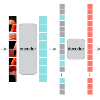Dyadic regression models, which predict real-valued outcomes for pairs of entities, are fundamental in many domains (e.g. predicting the rating of a user to a product in Recommender Systems) and promising and under exploration in many others (e.g. approximating the adequate dosage of a drug for a patient in personalized pharmacology). In this work, we demonstrate that non-uniformity in the observed value distributions of individual entities leads to severely biased predictions in state-of-the-art models, skewing predictions towards the average of observed past values for the entity and providing worse-than-random predictive power in eccentric yet equally important cases. We show that the usage of global error metrics like Root Mean Squared Error (RMSE) and Mean Absolute Error (MAE) is insufficient to capture this phenomenon, which we name eccentricity bias, and we introduce Eccentricity-Area Under the Curve (EAUC) as a new complementary metric that can quantify it in all studied models and datasets. We also prove the adequateness of EAUC by using naive de-biasing corrections to demonstrate that a lower model bias correlates with a lower EAUC and vice-versa. This work contributes a bias-aware evaluation of dyadic regression models to avoid potential unfairness and risks in critical real-world applications of such systems.
翻译:暂无翻译




